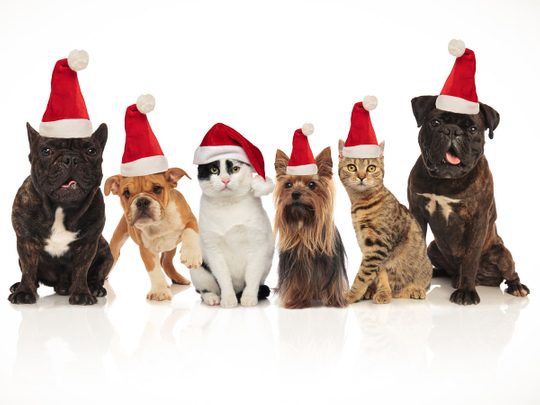
According to the British Veterinary Hospital, over 40 pets are reported missing during the October to December period in Dubai, a 30 per cent increase compared to the rest of the year. Loud noises, bright lights, and big crowds can frighten pets. Of course, you should go ahead and celebrate holidays with family and friends.
However, for your pets’ safety, always consider keeping them securely indoors at home while you celebrate elsewhere. There are certain steps that can be taken in order to make them feel as comfortable as they normally do, even in a different environment.
Ensure a comfortable ‘safe-zone’ is provided for your pet
Pets, particularly dogs and cats, naturally gravitate towards a particular room or area of the home. This could be due to a number of factors, ranging from sounds or colours and an association with ‘happy’ activities like playtime and food. If this area is out of the way of noisy holiday activities, ensure your pets remain there for the duration of festivities. If your pet’s usual preferred room is in the thick of the celebrations, try to establish a temporary place for your pets out of the way to ensure they have somewhere peaceful to retreat to when things become overwhelming.
Walk and play with them
Exercise is a great stress reliever for all pets. Dedicate more time to walking dogs and playing with cats. Not only is it extremely beneficial to their physical and mental health, but it also brings a distinct advantage during festive times. Tiring them out and expending all that energy is an excellent strategy to ensure they are more relaxed when it’s time for you to let off some steam with your guests.
Let your guests know
With so many new faces, both familiar and unfamiliar, pets can often become overly excited or fearful, depending on their personalities. Guests attending parties and gatherings should be introduced to pets whenever possible and the strangers made aware of the animals’ temperaments. Generally speaking, not being too fussy, erratic or loud around pets helps them to remain calm, putting everyone at more ease.
Give them what they want
This does not mean spoiling your pets with treats and toys. However, in situations where you know there might be loud and unfamiliar noises, such as fireworks, distracting your pet with something they can’t get enough of is a surefire way of ensuring their attention is always on what you want it to be on, and not on something that could potentially upset them.
Protect your pet from poisons
Many festivals, such as Christmas, create an influx of festive treats and traditions, such as chocolate in advent calendars and sweets, raisins, nuts, grapes, poinsettia, holly and mistletoe.
We all enjoy a richer diet over Christmas. However, Christmas dinners or desserts shouldn’t be shared with animals. They can trigger sickness and diarrhea or other conditions from renal disease, so try to stick to your pet’s regular diet and routine. Cooked bones, including turkey bones, should not be given to pets as they can splinter and puncture the digestive tract and dry fruits like raisins, can cause irreversible kidney disease.
Also, plants can be extremely toxic for your pet and ingestion of fertilisers in the soil can be dangerous too. If you are considering purchasing new plants for the season make sure they are safe and non-toxic before you decide planting greenery within the home.
Always be prepared
In the case of the unfortunate event that your pet gets ill during the festive season, take it to the vet. As with human beings, prevention is better than cure and preventive measures such as de-worming, tick treatment and specific prescription medications can be advised by the vet. This will ensure an unforeseen accident doesn’t turn into a crisis. With the increased risk of pet illnesses such as food poisoning or diarrhea, preventive measures or even putting the clinic’s number on the fridge just in case of an emergency could help save the pet in the nick of time. Pet owners should also ensure all pets are microchipped and official registrations are up to date. In the event your pet panics and runs away, this will help find your lost pet.
Keep decorative items out of reach
It is normal for lights and decorations to ‘deck the halls’ during celebrations. If you share a home with a pet, special care must be taken when decorating the house to ensure small ornaments and decorations are kept out of reach. We see a number of cases every year in which dogs and cats have eaten ornaments, which can lead to costly surgery and pet owners worrying when they should be celebrating.
Use technology
There are plenty of accessories on the pet market available to owners who wish to make their pets feel comfortable during distressing times. Items like the ADAPTIL Home Diffuser systems claim to send out ‘comforting messages’ to help all ages of dogs and cats feel calm and relaxed in situations that may cause fear and anxiety.
Punishment is not effective
A distressed animal may have uncharacteristic accidents around the home. This may include urination, vomiting, barking, and other forms of behavioural anomalies. This is normal for an animal in an anxious state and punishment will often make the behaviour worse. Instead, consolation and comfort will help ease your pet’s tension.
Consult a professional
Before the festive season commences, book a consultation with your vet to ensure your pet is in the best possible health. These consultations help maintain the general health and grooming of pets, but most importantly give you insights into how you can ensure the celebrations are as fun for your pets as they are for you.
Source: Dr Sara Elliott at British Veterinary Hospital





